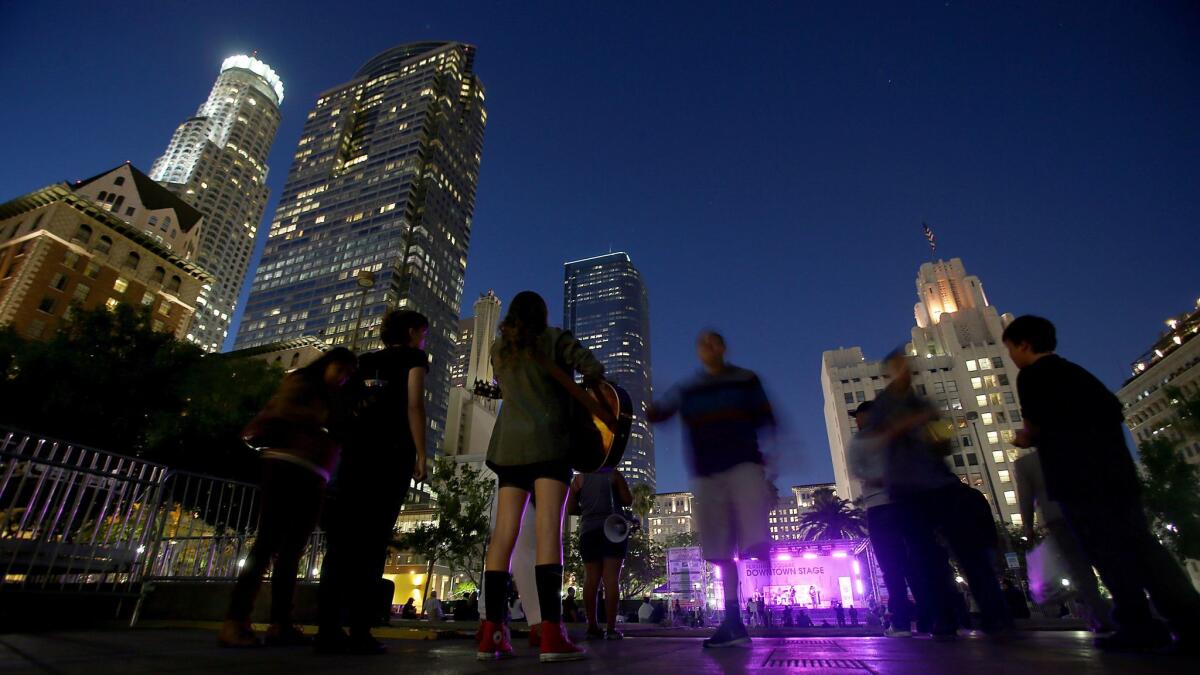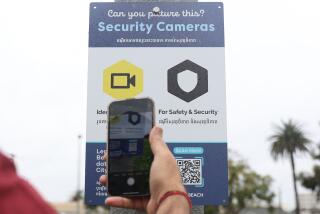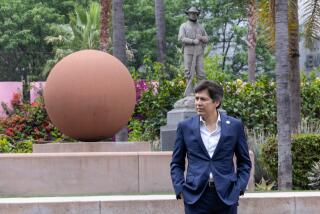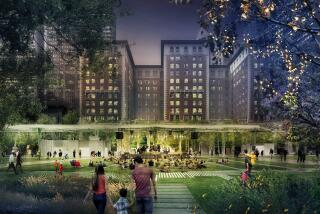Pershing Square summer concert photo policy draws fire

Photojournalist Cliff Cheng typically photographs large demonstrations taking place in Pershing Square, so he was eager to present a different image of the downtown Los Angeles park at its six-week concert series this summer.
But he was dissuaded from snapping photos of bands at their outdoor performances when he learned of a policy that bars professional photography equipment from the space during concerts, amounting to, in his opinion, a violation of the 1st Amendment.
Prompted by a complaint from Cheng, the American Civil Liberties Union on Aug. 3 sent a letter to city officials denouncing the Pershing Square summer concert photo policy and requesting its reversal.
Photo, video and audio recording devices — including “pro cameras, monopods, tripods, selfie sticks, iPads or professional photography/video equipment of any type” — are barred from the Saturday night concerts at the request of some performers, according to the Pershing Square website. The policy does not bar people from taking photos or videos with their cellphones.
The policy was set up per contractual agreement with artists, the website says.
But the rules illegally restrict free speech rights, the civil liberties group contends.
“The city doesn’t have a right to contract away the people’s 1st Amendment rights because some performer wants it that way,” said ACLU of Southern California chief counsel Peter Eliasberg, adding that “the ban is grossly over-broad.”
Eliasberg wrote the seven-page letter, addressed to the city attorney and the general manager of the Department of Recreation and Parks, on behalf of more than a dozen journalism and photography organizations.
The letter also denounces the park’s ban on the distribution of promotional items and fliers during concerts without prior permission.
“Neither the photography/videography ban nor the arbitrary permitting scheme for the distribution of the expressive materials will be upheld in court as valid time, place, and manner restrictions on the First Amendment,” the letter said.
Rose Watson, a spokeswoman for the Recreation and Parks Department, said journalists can contact bands ahead of time to request permission to take photographs. She added that anyone can take photos with their cellphones.
“It is a public space. We film and tweet all the time. Everyone has their phones out,” Watson said.
She specified, however, that cameras with tripods were banned because they took up too much space. Watson was uncertain if the policy barred photographers with hand-held professional cameras from shooting.
Watson said the department is reviewing the ACLU’s letter and examining the wording of its policy. The city attorney’s office is also reviewing the letter, according to a spokesman.
Cheng, the photojournalist, had reached out to the producer of the B-52s, performing Saturday in Pershing Square, to request permission to photograph the concert, but a band manager denied his request.
Wayne Sharp, a manager for the band, said that he asked the city to discourage concertgoers from taking photos and that he would prefer professional photographers not shoot at all. But he acknowledged there was little he could do if someone took a photograph.
“We cannot control the laws,” Sharp said. “If the law says we are playing in a public space … we don’t have any control over that.”
Jamie Brown, a singer in the band Boogie Knights, which performed earlier this summer, said the group was unaware of any photo policy.
Despite the policy, Cheng said he plans to attend an upcoming concert with a group of photographers to see if officials will stop him from shooting the performance.
Shari B. Ellis, a freelance photographer, took photos with her cellphone at the Toad the Wet Sprocket concert on Aug. 5. She said she left her camera behind after a friend warned her ahead of time they were barred, but no one told her to put down her phone.
“Part of the enjoyment for me is documenting the experience,” Ellis said.
ALSO
Yosemite struggles to find an answer to traffic woes
Anti-Trump protesters sue San Diego over arrests at demonstration
Youths in foster system can get help until age 21. So why do so many still struggle?
More to Read
Sign up for Essential California
The most important California stories and recommendations in your inbox every morning.
You may occasionally receive promotional content from the Los Angeles Times.










